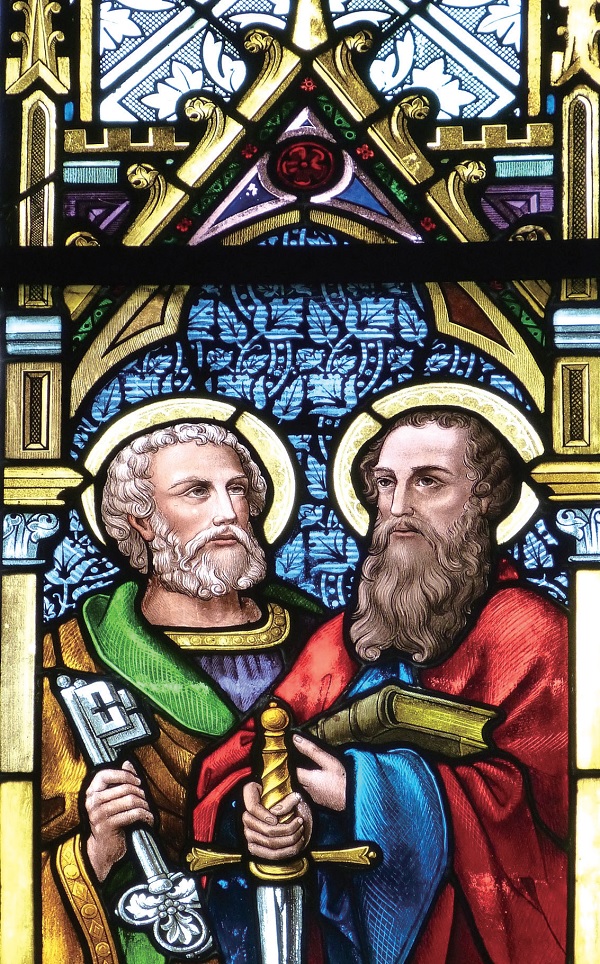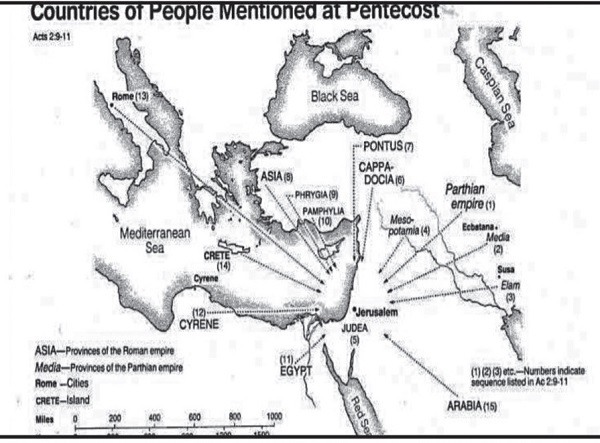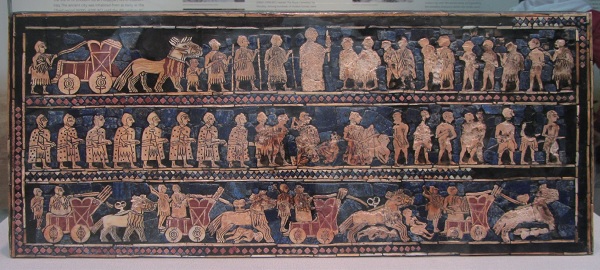Isolation and Overcoming
New and Old Testament Strategies for Facing Multicultural Situations
[Interpretation of Pluralist Culture]
Oral narration and pictures/Shao Wensi‧Compilation/Wang Shufei

In a country of spiritual darkness, Daniel and the few who persisted in fearing the Lord responded to their trust in God with their actions and lifestyle in a society with a pluralistic culture.
How many of us today would respond similarly to a covenant-keeping Creator?
▲It can be seen from the excavated stone tablets that Ur society had a fairly complete and sophisticated structure in the time of Abraham.
Strategies for facing multicultural situations in the Old Testament era
The four most important periods in the history of Israel in the Old Testament: Abraham in Ur; Moses in Egypt; the Israelites in Canaan; and the exiles in Babylon.
While in a culture different from the Hebrews, God repeatedly commanded Israel to be holy. The original meaning of holiness is to be set apart as holy to Jehovah, that is to say, the Israelites were to be separated from other cultures and surrendered to Jehovah. The specific way is not to mix or mix with other races; not to accept their way of life; not to worship the gods they worship.
Let us look at how God protects the elect in the Old Testament and asks them to use isolation as a strategy to face multiculturalism.
1. Abraham in Ur
Ur in the time of Abraham was like New York City today. It was a place where humanities gathered, and it was a city that was very advanced in all aspects of economy, politics, society, technology, and culture. The stone tablets excavated in Ur depict the lives of common people from the front, divided into three levels: the poor working class at the bottom; the upper class in the middle; and the royal family at the top. The reverse depicts the military class, which is also divided into three levels: soldiers; officers; and the royal family. This shows that the social structure of Ur is quite complete and sophisticated. Abraham was unable to contend with that kind of culture alone at the time, so God called him to leave Ur. Genesis Chapter 12:1-4 records God’s call, promise to Abraham, and his trust and obedience.
2. Moses in Egypt
Egypt in the time of Moses was even more filled with idols. Goddess such as Isis and the Sun God are the objects of daily worship by ordinary people and dominate all aspects of their lives. There are many other gods. When Moses led the people out of Egypt, the ten plagues God sent were actually aimed at the idols worshiped by the Egyptians. God actually declared that these gods were false gods, and that only Jehovah is the Lord of creation and the only one. One true God.
3. The Israelites in Canaan
Compared with the Israelites who wandered in the wilderness for 40 years, the Canaanites were brave and good at fighting. The local products were rich, the civilization was advanced, and it was also a place where many gods were worshiped. Among them, the way to worship the god Molech is to sacrifice babies through fire. Others include Asherah, Canaanite god, Dagon god, etc. When the Israelites entered Canaan, they faced a pluralistic culture, and it was a high culture.
Israel, which has no immunity at the spiritual level, found in this pluralistic culture that the Canaanites lived a prosperous life and worshiped whatever gods they needed. They believed that worshiping only Jehovah God was not enough, and they also wanted to worship the gods of the land of Canaan. This caused trouble. angered the jealous God.
The cultural situation we are in today has also caused many people to make the choice of "walking in two boats" in order to integrate into mainstream society. We want to follow Jehovah God and we want to follow the god of this world. God promulgated the law at Mount Sinai, established a worship system, and repeatedly reiterated God's intentions for them. However, the Israelites still followed their own will, failed to obey God's instructions, and did not completely eliminate the Canaanites. This caused the biggest mistake. .
4. The captives in Babylon
After the destruction of both the northern and southern kingdoms of Israel, the chosen people were taken captive to Babylon. How did they maintain a God-fearing life in foreign lands? How do the few Israelites cope with the huge influence and oppression of the mainstream Babylonian culture? In a country of spiritual darkness, Daniel and a few people who persist in fearing the Lord, in a society with a pluralistic culture, even if they face life and death, still deliberately separate themselves and respond to their trust in God with actions and lifestyles.
How many of us today would respond similarly to a covenant-keeping Creator? The multicultural challenges we face today are no more difficult than those faced by Israel at that time. Do you and I dare not commit ourselves to worshiping Jehovah as well as the idols of the world because we are afraid of not being able to integrate into mainstream society? We sincerely hope that the history of Israel can serve as an example for us to come before God humbly and follow Jehovah God single-mindedly with an honest and pure conscience.
Strategies for Facing Multicultural Situations in the New Testament Era
God’s truth remains unchanged, but the way in which the gospel is expressed can be somewhat flexible due to the historical and cultural background of the times or the circumstances. We can get a glimpse of this from the way the apostles of the early church preached the gospel.
The four gospels record the message of the Great Commission entrusted to the disciples by Jesus Christ after his resurrection and before his ascension into heaven. This information has a difficult task both geographically and ethnically. From a geographical perspective, they preached the gospel from “Jerusalem, and all Judea and Samaria, to the ends of the earth.” From a racial and cultural perspective, Jews must not only overcome cultural differences, but also put aside their national traditions, national sense of superiority, and their inherent worldview, and spread the gospel of salvation to non-Jews who were originally considered unclean and unworthy.
We can look at the powerful work of the Holy Spirit at Pentecost and Paul’s missionary journey recorded in the Acts of the Apostles to see God’s strategy in dealing with multicultural situations in the New Testament, which is the crossing of multiculturalism.

▲ The apostles Peter and Paul overcame numerous cultural barriers to fulfill the Great Commission.
Acts, chapters 1-11, records that God pushed the Hebrew Jews in Jerusalem (chapters 1-5) through the powerful hand of the Holy Spirit to undergo five waves of cultural crossover (Figure 1).

1. From traditional Hebrew Jews to Hellenistic Jews (Chapter 6-7)
On the day of Pentecost, many Hellenistic Jews scattered throughout the Roman Empire, as well as some non-Jews, came to Jerusalem and witnessed the strange scene of the outpouring of the Holy Spirit. The Hebrew Jews, who claimed to be of a higher level and had a sense of superiority, originally looked down on the Hellenistic Jews, thinking that they were collaborating with the Gentile culture. At this time, the Holy Spirit was poured out, and these Hebrew Jews crossed the cultural barrier and spread the good news of the resurrection of Jesus Christ to the Hellenistic Jews. This was the first wave of crossover.
2. From Hellenistic Jews to Samaritans (8:1-25)
When persecution began and the disciples had to leave Jerusalem, they spread the word as they went. Philip, a Hellenistic Jew, was the first to preach the gospel to the Samaritans after Jesus was resurrected and ascended to heaven. The Jews had always despised the Samaritans, believing that their blood was mixed with the Gentiles, worshiped impure mixed religions, and did not abide by traditions, so they disdained association with them. However, the power of the Holy Spirit pushed the Christian disciples to cross over again with the gospel.
3. From Hellenistic Jews to Gentile proselytes who converted to Judaism (8:26-40)
Then an African Ethiopian eunuch appeared. He was a converted Gentile. Although he could not enter the temple to worship God, he was still full of thirst for God and God's words. So Philip explained the gospel to him. After he understood it, he was baptized into the Lord with joy.
4. From the Hebrew Jews to the Gentiles who feared God but did not follow Jewish culture (10:1-11:18)
The centurion Cornelius was a pious and God-fearing Gentile, but it was really impossible for Peter, who kept Jewish laws, to enter this Gentile's home, and it was not in line with their Jewish traditions. However, Peter followed God's instructions and overcame unacceptable cultural barriers and reported to the church in Jerusalem as a leader, initiating the fourth wave of the gospel.

▲ Hellenistic Jews from all over the Roman Empire witnessed the coming of the Holy Spirit on Pentecost.
5. Pagan Gentiles who have nothing to do with the one true God (11:19-26)
The disciples, who were scattered due to persecution, traveled further and further away from Jerusalem; the fifth wave of crossing began with the pagan Gentiles, based in Antioch, and continued to push forward until it reached the ends of the earth at that time.
In the first 11 chapters of Acts, each wave of cultural crossing brings spiritual vision, spiritual insight, and spiritual discernment, so that we know how to pray before God and how to pray.
With every wave of cultural crossover, the church as a whole goes through three processes. The first step is divine leadership. God’s hand pushed the disciples to leave Jerusalem, and also pushed Philip to make different cultural crossings in different places. The second is to let go of racial prejudice. Although Philip was a Hellenistic Jew, it still went against the traditional education he had received to require him to ride with, talk to, and baptize with the Ethiopian eunuch. Before Peter was willing to go to the house of Cornelius, he also argued with God about what he could and could not eat. They were able to put aside their racial prejudices because of the third process—God’s persuasion.When the Holy Spirit convinces you and me to put aside our prejudices and we are willing to submit to God’s leadership, the church will be able to break through the limitations of its own cultural worldview, transcend cultures, and preach the gospel that transcends cultures.
Paul's strategy
After five waves of cultural leaps, the gospel continued to advance along with Paul's missionary journey. What strategies did he use in different places and with different audiences?
1. Faithfully preach Jesus as the Christ
In Acts 17, Paul and Silas came to Thessalonica and entered the synagogue as usual to explain and demonstrate that Christ must suffer and rise from the dead. The Jesus he preached was the Christ. He did not say that because he was dealing with this group of Greeks, he would adjust the message to the beliefs of the Greeks. Paul's preaching caused such a stir in the local area that they called him "a troubler of the world." Paul's strategy when dealing with multicultural groups was to faithfully communicate the gospel message: Jesus Christ is the Anointed One, the Messiah. Although the Gentiles in the city at that time thought He was another king and did not know the unique identity of the Anointed One, God's hand still accomplished great things.
2. Taking creation, covenant, and kingdom as the gospel structure
Also in Acts 17, when Paul came to Athens, the city of wisdom, where elites and high-level intellectuals gathered, he debated with the locals not only in the synagogues but also in the streets, including Epicurus and Stoia. mainstream academics. The Epicurean school at that time advocated indulging in pleasure and not restraining selfish desires. The Stoics advocated abstinence, facing the pain of the world with stoicism, and abstaining from behavior and controlling passions. These eloquent philosophers said that Paul was a "babbler." The Greek word means a bird that keeps making "tat-tat-tat-tat" noises, and describes a person who makes meaningless noises all day long. Calling Paul this way was meant to express contempt, pointing out that Paul was unattractive, uneducated, and his words were like yelling. Others said that Paul "seems to have spread rumors about foreign ghosts and gods." This was a serious accusation at the time. Socrates was accused and sentenced to death because of this statement. Gentile ghosts and gods in Greek culture have nothing to do with the belief in Greek gods. Because Paul preached the resurrection of Jesus Christ, scholars from these two mainstream schools did not believe in the resurrection of humans, so they classified Paul as preaching to the Gentiles. Ghostly.
They took Paul to the Areopagus, the seat of the Athenian Council and the place where, according to Greek legend, lambs were sacrificed to quell plagues. Paul said, "I see that in everything you do, you fear gods and demons... You worship gods... which have the name "Unknown God" written on them. I say to you now what you worship that you do not know," as if to appease those who opposed him. person, but this was not his intention. He actually wanted to point out that they worshiped gods that they did not even know, in order to deconstruct the Athenian worldview.
Paul’s gospel structure when facing people from different cultures. The first is creation: God is the Lord who created the universe and all things, as well as His supremacy, dominion, and transcendence. The second is covenant: the covenant relationship between God and man will never change, and man will betray his faith. , but God will never go against what He said; the third is the kingdom: the Creator extends from one person, Adam, to various nations and races, giving the breath of life to all people, not far from everyone, and giving people the heart to seek God.
Paul's first obvious strategy is to introduce the God of creation directly. He said, “The Lord of heaven and earth, the one who created the universe and all things in it, is God. But you don’t know the Lord who created the universe, heaven and earth. You are now worshiping a God that you don’t even know. Maybe he doesn’t. Not God.” When people do not know the Lord of creation, they are doomed to remain ignorant. Here Paul lets us see that “the Lord of heaven and earth does not dwell in temples made with hands, nor is he served by human hands, as if he needed anything, but he himself gives to everyone life and breath and all things. From one he created "Out of all nations." The original text of "one" here means that He extended every nation and every ethnic group from Adam, and determined in advance their time limit and the boundaries where they would live.
Paul also quoted the words of a famous Greek poet, "We are also his children," pointing out the epistemological deficiencies in the Greek worldview: they knew that there was a miraculous power that saved them from the plague, but they did not know what this miraculous power was. So Paul introduced the Creator by saying:"Since we are born of God, we should not think that the divinity of God is like gold, silver, or stone carved by man's craftsmanship and thought. When the world was ignorant, God did not monitor it, but now He commands everyone everywhere to Repent. For He has appointed a day in which He will judge the world with righteousness by the man whom He has appointed, and He will give a sure sign to all men by raising Him from the dead.”
Paul’s conclusion does not stop at repentance, but God’s righteousness and judgment.
When we preach the gospel, can we boldly mention God’s righteousness and judgment? The most important thing is to have a compassionate and kind attitude, rather than using harsh and judgmental words to say that sinners will go to hell. Preaching the gospel must come from the heart, not just words or formulas. The goal of evangelism is not only to bring people to the church, but to bring people to Jesus Christ.
Jesus Christ completed the redemption prophesied by God since the Old Testament. He died on the cross for us, was resurrected, and ascended to heaven. Then the Holy Spirit comes upon the life of every man of God and a follower of Christ.When our lives are united with Christ, it is a matter of continually choosing to surrender to the sovereignty of God.During the Old Testament period, God wanted the Israelites to separate themselves in a multicultural environment. During the New Testament period, God's people had the Holy Spirit in their lives. When faced with multicultural situations, their antibodies strengthened and they were able to make leaps and bounds.
in conclusion
In an era where traditional structures and values are rapidly collapsing, I hope this series of information will help everyone expand their horizons. The cultural environment will definitely affect people's overall life and choices; theological thinking explores God's intentions in the cultural environment. Therefore, theological thinking and discussion cannot be separated from culture. When we care about some important social issues, we must have a clear insight through an understanding of the cultural worldview.
Every culture has three basic elements, namely origin, power, and ultimate destiny, which influence the culture's social structure, ideas, beliefs, and lifestyle. I pray that readers will get rid of their self-centered thinking mode, listen more and have an understanding heart, and give each other more thinking space, so that it is possible to understand ethnic groups with different cultures from ours.
What God exhorts us through the Acts of the Apostles is not just a missionary model, but a way for believers in multicultural situations to clarify the essence of the gospel and preach the complete gospel across cultures.
I deeply hope that this series of articles can inspire readers to re-examine the gospel they believe and preach, and to experience multiculturalism. The gospel is the power of God. Even under the challenge of multiculturalism, God still inspires individual Christians and the church as a whole to take root in the truth and see their responsibilities in the gospel and cultural mission.
Bibliography and sources:
- 1. Lingenfelter, Sherwood G., and Marvin K. Mayers. Ministering Cross-Culturally: A model for Effective Personal Relationships. Ada, MI: Baker Academic, 2016.
- 2. Smart, Ninian. Worldviews: Crosscultural Explorations of Human Beliefs. Upper Saddle River, NJ: Prentice Hall, 2000.
- 3. Sire, James W. The Universe Next Door: A Basic Worldview Catalog. Downers Grove, IL: IVP Academic, 2004.
- 4. Larkin, William, and David Cashin. Culture and Worldview Course Curriculum. CIU, 2006.
- 5. Vanhoozer, Kevin J. “The World Well Staged? Theology, Culture, and Hermeneutics,” in God and Culture.
- 6. Carson, DA, and John D. Woodbridge, ed. God and Culture. Grand Rapids, MI: Eerdmans Publishing, 1993.
- 7. Henry, Carl. God, Revelation and Authority, vol. 1. Waco, TX: Word Books, 1976.
Mrs. Shao Wensi currently pastors a church with her husband and is pursuing a doctorate in theological studies. She has worked in professional business management, finance and taxation, and computer communications. While educating his children at home, he completed a Master of Divinity; he has devoted himself to theological education, home education, marriage and family ministry, discipleship training, Bible teaching, Eurasian missions and church planting, and preacher training. They have three adult sons, one daughter, and four grandchildren.


